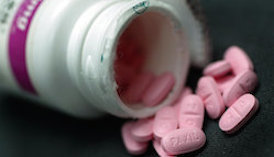This Paxil Fact File, containing confidential information about one of our most widely prescribed antidepressants and anti-anxiety medications, was drafted and distributed by SmithKline Beecham in 1998 for internal use only. Now GlaxoSmithKline, the drug maker acknowledges in these pages that Paxil/Seroxat causes serious, widespread side effects and withdrawal symptoms—in the February 2001 paper below, it put that number at a staggering 20% of patients. But it continued to press for an FDA license to treat social anxiety disorder (with symptoms including “fear of eating alone in a restaurant”), and advised its staff on how to spin or mask the problem of withdrawal (change the subject or put the side effects “in context”). The FDA awarded the license in March 1999, just a few months after the fact file circulated.
In the BBC Panorama segments below, which aired in Britain on October 3, 2004, David Healy says we may come to see GSK’s masking of data about these withdrawal symptoms as “one of the biggest medical scandals ever.” Senior pharmaceutical regulators in the UK acknowledge they were “disgusted” and “horrified” by the deliberate withholding of information. The President of the Royal College of Psychiatrists, Dr. Mike Shooter, argues that the deception “has serious implications for the whole of psychiatry; it has serious implications for the whole of medicine.” An investigative body in Britain met to consider whether to indict the drug maker on criminal charges.
Section 1: Towards the Second Billion—All SSRIs Are Not the Same
Section 2: New Indications: Social Anxiety Disorder / Social Phobia
Section 3: Issues Management: Managing the Discontinuation Issue.
Related Papers and Programs
“Duration of Treatment and Depression: Relapse and Recurrence Rates” (Feb. 2001; GlaxoSmithKline Confidential—Internal Use Only).
“Paxil CR” Product Monograph (GlaxoSmithKline; Nov. 1, 2005).
Paxil Litigation Documents (Filed Under Seal; Nov. 11, 2007).
GSK’s Ghostwriting Agency “Budgeted for 50 articles in 2000,” According to the Drug Maker Itself (Apr. 2000).
BBC Panorama program “Taken on Trust” (UK; Oct. 3, 2004):
Part 1 of 7 (9:36 minutes); part 2 (9:47 minutes); part 3 (9:41 minutes); part 4 (8:46 minutes); part 5 (9:39 minutes); part 6 (7:28 minutes); part 7 (7 minutes).
Additional Resources, Papers on Withdrawal Syndrome, and Advice about Tapering Safely
“Rebound Syndrome: When Drug Treatments Fail,” excerpt from Shyness: How Normal Behavior Became a Sickness (Yale UP, 2007), chapt. 5.
“Antidepressant Withdrawal and Patient Safety,” Psychology Today (Oct. 15, 2018).
“Antidepressant Withdrawal Said to Affect ‘Millions’,” Psychology Today (Oct. 6, 2018).
“Antidepressant Withdrawal Syndrome: Why SSRI Antidepressants Often Produce a Withdrawal Syndrome,” Psychology Today (Jul. 17, 2011).
“Breaking Up with One’s Meds: A Chronicle of Withdrawal Syndrome from Psychiatric Meds,” Psychology Today (Jul. 31, 2015).
Resources: Websites Focusing on Antidepressant, Antipsychotic, and Benzodiazepine Withdrawal

